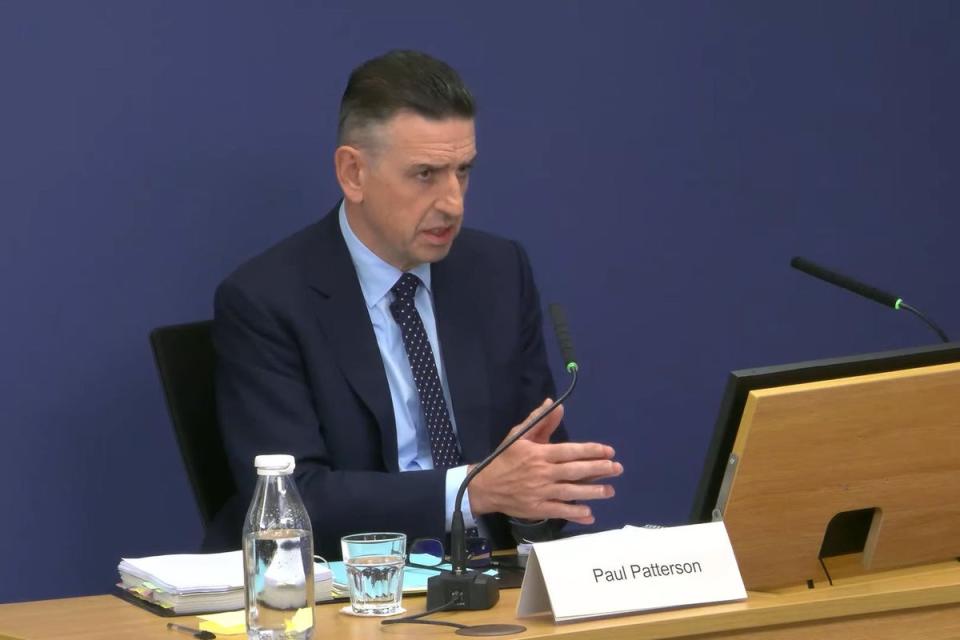Fujitsu boss admits his company knew right from the start about the Post Office IT problem
Fujitsu knew of defects in the Horizon IT system for nearly two decades, while witness statements used in the prosecution of subpostmasters were edited to omit references to the problems, the software manufacturer’s European chief has admitted.
Fujitsu Europe director Paul Patterson told the official inquiry into the Post Office scandal that bugs and errors in the faulty accounting system were known about “right from the very start” by “all parties”.
And he said he had seen evidence of the editing of witness statements – an action he described as “shameful” and “appalling”.
Hundreds of subpostmasters were prosecuted for theft and false accounting because of errors generated by the Horizon software, in what Rishi Sunak has described as “one of the greatest miscarriages of justice in our nation’s history”.
Their plight was highlighted in an ITV drama, Mr Bates vs The Post Office, which triggered a public outcry earlier this month and led the prime minister to announce plans to exonerate those who had been affected by the scandal.

Fujitsu is now facing demands to contribute a “substantial” sum towards the mammoth £1bn compensation bill, after the company admitted earlier this week that it had a “moral” duty to do so.
Giving evidence to the official inquiry into the fiasco, Mr Patterson said that the earliest report of a bug he was aware of was in November 1999, and the latest in May 2018.
When asked if Fujitsu knew about the existence of errors and defects at a “corporate level”, he said that “right from the very start of the deployment of this system, there were bugs and errors and defects which were well known to all parties”.
He told the inquiry: “I’m surprised that that detail was not included in the witness statements given by Fujitsu staff to the Post Office – and I’ve seen some evidence of editing of witness statements by others.”
Pressed by the inquiry lawyer on how he would describe the editing out of bugs or “data integrity problems” in witness statements, he said: “Shameful, appalling – my understanding of how our laws work in this country [is] that all of the evidence should have been put in front of the subpostmaster, that the Post Office was relying on to prosecute them.”
Mr Patterson also told the inquiry that data provided to subpostmasters during criminal proceedings was “not sufficient” for them to understand whether Horizon was “operating correctly at the relevant branch”.
It was “certainly not a gold standard or any standard – it’s a very simple Excel file which tells you not very much”, he added.
Appearing in front of MPs on the business and trade committee on Tuesday, Mr Patterson acknowledged that Fujitsu had a “moral obligation” to contribute to the compensation awarded to subpostmasters. But he said that the “right place to determine that” was after the official inquiry had published its findings.
His appearance came as the Post Office was ordered by the government to investigate a second IT system after the i newspaper revealed that a number of subpostmasters had claimed to have been convicted of theft on the basis of errors generated by Capture software.
The government has now been asked to look into the case of Steve Marston, a 67-year-old former subpostmaster in Heap Bridge, Greater Manchester, who claims that errors in the software – a precursor of Horizon – led to his being convicted of theft and false accounting offences in 1998.

On Thursday, the Department for Business and Trade asked the Post Office to establish “if there are issues with any other systems currently or previously used by [the] Post Office”, following reports that three former subpostmasters had said that the system was prone to errors and caused shortfalls when they went to balance their books.
A Post Office spokesperson said: “We take very seriously the concerns that are being raised about cases from before the Horizon system was first rolled out in 1999, and we will of course assist in looking into such cases brought to our attention.”
Mr Marston said he had not stolen “a penny” but had pleaded guilty in order to avoid being sent to prison.
“They said pleading guilty was the only way to avoid going to jail,” he said. “I just thought it must be something I’m doing wrong; computers were in their infancy, you didn’t think they could be wrong.”
“They said, ‘Capture doesn’t make mistakes,’” he added.


